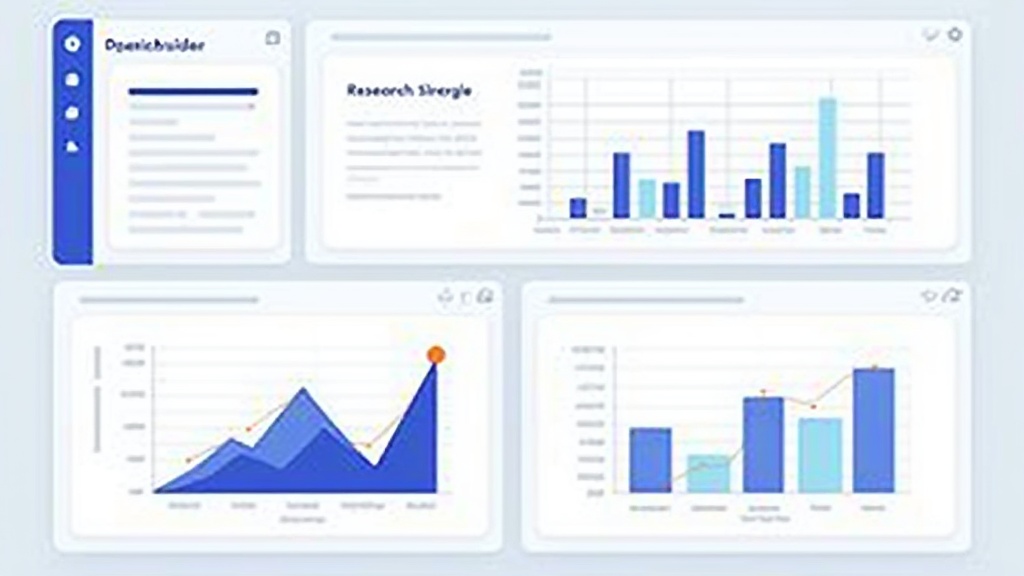Market Research Templates - Ready-to-Use Research Tools
Research templates save time and standardize quality. Here's how to select, customize, and use templates for surveys, interviews, focus groups, and analysis.
11 min read
Agent Interviews
Updated: 2025-11-13
The Strategic Value of Research Templates
Market research templates are essential accelerators for research efficiency, quality consistency, and methodological rigor across diverse market research projects.

These pre-designed frameworks embody best practices accumulated from thousands of research studies, enabling organizations to launch projects more quickly while maintaining professional standards and avoiding common methodological pitfalls.
The value of research templates goes way beyond time savings to include quality standardization that ensures consistent data collection approaches across different projects, researchers, and time periods. This standardization becomes particularly crucial for organizations conducting regular research, longitudinal studies, or multi-project research programs where consistency enables meaningful comparison and trend analysis.
Research templates also democratize access to sophisticated research methodologies by making expert-designed approaches available to researchers with varying levels of experience. Junior researchers can use templates created by senior methodologists, while experienced researchers can use templates as starting points for customization rather than building from scratch.
The evolution of research templates has paralleled advances in research technology and methodology, with modern templates incorporating digital-first design principles, mobile optimization, multi-modal data collection approaches, and integration capabilities that reflect contemporary research practices according to research best practices established by the American Marketing Association. This evolution ensures that templates remain relevant and effective in rapidly changing research environments.
Customization capabilities are a critical aspect of template value, enabling researchers to adapt pre-designed frameworks to specific research objectives, target audiences, and organizational requirements. The most effective templates balance proven methodological approaches with flexibility that supports diverse application scenarios.

Template Selection and Customization Criteria
Effective template selection requires systematic evaluation of research objectives, target audience characteristics, data collection constraints, and analytical requirements. Organizations that develop structured approaches to template selection achieve better research outcomes and more efficient project execution.
Research objective alignment is the primary criterion for template selection. Brand awareness studies require different question structures and analytical frameworks than customer satisfaction research or market segmentation projects. Understanding research objectives upfront enables more precise template selection and reduces the need for extensive customization.
Target audience considerations significantly influence template appropriateness. Templates designed for consumer research may require substantial adaptation for B2B applications, while templates optimized for specific demographic groups might not transfer effectively to different populations. Audience characteristics including education levels, technical familiarity, cultural background, and language preferences should inform template selection decisions.
Project complexity assessment helps determine whether basic templates provide sufficient structure or whether more sophisticated frameworks with advanced logic, quota management, and analytical components are necessary. Complex research projects benefit from templates that include detailed implementation guidance and quality control mechanisms.
Timeline and resource constraints often influence template selection, with some templates enabling rapid deployment while others require extensive customization and testing. Understanding implementation timelines helps researchers select templates that align with project schedules while maintaining quality standards.
Integration requirements with existing research infrastructure, CRM systems, and analytical platforms affect template viability. Templates that support necessary integrations reduce implementation complexity and enable more seamless research workflows.
Survey Questionnaire Templates by Research Type
Brand awareness and perception surveys require carefully structured question sequences that capture both aided and unaided awareness, brand associations, competitive positioning, and purchase consideration. Effective brand templates include standardized metrics that enable benchmarking while providing flexibility for brand-specific customization.
Customer satisfaction templates focus on experience measurement across different touchpoints, service quality assessment, loyalty indicators, and recommendation likelihood. These templates typically include validated scales like Net Promoter Score (NPS), Customer Satisfaction Score (CSAT), and Customer Effort Score (CES) that enable comparative analysis and trend tracking.
Market segmentation templates use sophisticated questioning approaches designed to identify distinct consumer groups based on demographics, behaviors, attitudes, and preferences. These templates often include cluster analysis preparation, lifestyle assessment batteries, and behavioral profiling questions that support advanced analytical approaches.
Product development and concept testing templates structure feedback collection around specific product attributes, usage scenarios, feature prioritization, and purchase intent. These templates balance quantitative metrics with qualitative feedback collection to provide actionable insights for product teams.
Pricing research templates incorporate methodologies like Van Westendorp Price Sensitivity Meter, conjoint analysis frameworks, and willingness-to-pay assessment that enable sophisticated pricing strategy development. These templates require careful customization to specific product categories and market contexts.
Employee engagement and organizational culture templates address internal research needs with question frameworks covering job satisfaction, management effectiveness, communication quality, and organizational commitment. These templates must balance thorough assessment with survey length constraints that affect response rates.
Interview Guide Frameworks and Scripts
Structured interview guides provide consistency across different interviewers while maintaining the flexibility that enables deep exploration of participant perspectives. Effective interview templates include question frameworks, probe suggestions, and facilitation guidance that support both novice and experienced researchers.
Customer interview templates focus on experience mapping, pain point identification, solution preferences, and behavioral insights that inform product and service development. These templates typically include funnel questioning approaches that move from general experiences to specific feedback and suggestions.
Expert interview frameworks support B2B research and thought leadership development through structured approaches for engaging industry experts, executives, and specialized professionals. These templates balance respect for participant expertise with research objectives that require specific information collection.
Focus group moderator guides provide frameworks for managing group dynamics while ensuring thorough topic coverage. These templates include timing guidance, activity suggestions, and strategies for managing different personality types and participation levels within group settings.
User experience interview templates support design and development processes through structured approaches for understanding user behaviors, preferences, and interaction patterns using qualitative research methods. These templates often include task-based activities and observation frameworks that complement verbal feedback.
Ethnographic interview guides enable deep cultural and behavioral research through frameworks designed for longitudinal engagement and natural conversation flow. These templates emphasize relationship building and contextual understanding over structured data collection.
Data Collection Forms and Protocols
Observational research templates provide structured frameworks for systematic behavior documentation, environmental assessment, and interaction recording. These templates ensure consistent data collection across different researchers and observation sessions while maintaining objectivity and minimizing bias.
Mystery shopping templates standardize evaluation criteria, interaction documentation, and experience assessment across different locations, staff members, and time periods. These templates balance thorough assessment with natural interaction requirements that maintain the authenticity of the shopping experience.
Digital ethnography templates support online community research, social media analysis, and digital behavior documentation through structured approaches for content analysis, interaction mapping, and trend identification. These templates adapt traditional ethnographic methods for digital environments.
Experimental design templates provide frameworks for A/B testing, controlled trials, and systematic intervention evaluation. These templates include randomization protocols, outcome measurement frameworks, and analytical approaches that ensure valid experimental results.
Competitive analysis templates structure systematic evaluation of competitor offerings, positioning strategies, marketing approaches, and customer experiences. These templates enable consistent competitive intelligence gathering across different analysis periods and market segments.
Regulatory and compliance documentation templates ensure that research activities meet legal requirements, ethical standards, and industry guidelines. These templates include consent forms, privacy notices, data handling protocols, and documentation requirements that protect both participants and organizations.
Analysis Frameworks and Reporting Templates
Quantitative analysis templates provide structured approaches for descriptive statistics, correlation analysis, regression modeling, and advanced statistical techniques following guidelines established by the American Statistical Association. These templates include data preparation guidelines, assumption testing protocols, and interpretation frameworks that support valid analytical conclusions.
Qualitative analysis templates offer systematic approaches for coding, theme identification, pattern recognition, and insight synthesis. These templates balance methodological rigor with creative insight development, providing frameworks that support both individual and team thematic analysis processes.
Cross-tabulation templates enable systematic exploration of relationships between variables, supporting market segmentation, audience profiling, and correlation analysis. These templates include statistical significance testing and practical significance assessment that inform strategic decision-making.
Trend analysis templates provide frameworks for longitudinal data examination, seasonal pattern identification, and forecasting approaches. These templates support both historical analysis and predictive modeling that inform strategic planning and resource allocation decisions.
Comparative analysis templates enable systematic evaluation of different options, alternatives, or scenarios through structured frameworks that ensure consistent evaluation criteria and objective assessment approaches.

Dashboard and visualization templates translate research findings into compelling visual narratives that communicate insights effectively to diverse stakeholders. These templates balance analytical depth with accessibility, ensuring that complex research findings become actionable business intelligence.
Research Proposal and Project Planning Templates
Research proposal templates provide structured frameworks for project scoping, methodology selection, timeline development, and budget estimation. These templates ensure that proposals include all necessary elements while presenting information in formats that facilitate approval and implementation decisions.
Project planning templates support systematic research design, resource allocation, risk assessment, and milestone definition. These templates help research teams organize complex projects while maintaining flexibility for adaptation as projects evolve.
Vendor evaluation templates standardize assessment criteria for research service providers, technology platforms, and specialized consultants. These templates ensure consistent evaluation approaches that support informed vendor selection decisions.
Budget planning templates provide frameworks for cost estimation, resource allocation, and financial tracking across different research project types. These templates include common cost categories, contingency planning, and value optimization approaches.
Risk assessment templates identify potential project challenges, mitigation strategies, and contingency planning approaches. These templates help research teams anticipate problems and develop proactive solutions that minimize project disruption.
Quality assurance templates establish standards for data quality, methodological rigor, and deliverable excellence. These templates include review protocols, validation approaches, and continuous improvement frameworks that maintain research standards.
Template Adaptation and Version Control
Customization best practices ensure that template modifications enhance rather than compromise research quality. This includes maintaining methodological integrity while adapting questions, scales, and analytical approaches to specific research contexts and organizational requirements.
Version control systems enable organizations to track template evolution, maintain historical versions, and coordinate updates across research teams. Effective version control prevents confusion and ensures that all team members use current template versions.
Testing and validation protocols ensure that customized templates function effectively before deployment in critical research projects. This includes cognitive testing, technical validation, and pilot implementation that identifies potential issues before full-scale deployment.
Documentation standards for template customization maintain institutional knowledge and support knowledge transfer as team members change. Clear documentation enables future researchers to understand customization rationale and build upon previous work.
Feedback integration processes capture lessons learned from template usage and incorporate improvements into future versions. This continuous improvement approach ensures that templates remain current and effective over time.
Legal and compliance review ensures that template customizations maintain adherence to privacy regulations, industry standards, and organizational policies. Regular compliance assessment prevents legal issues and maintains participant trust.
Building Template Libraries and Knowledge Management
Organizational template libraries enable systematic knowledge capture, sharing, and reuse across research teams and projects. Effective libraries include categorization systems, search capabilities, and usage analytics that maximize template value and accessibility.
Quality standards for template inclusion ensure that libraries maintain high standards while supporting diverse research needs. Clear criteria for template approval, review, and retirement maintain library quality and relevance.
Training and onboarding programs help research teams effectively utilize template libraries and understand customization best practices. These programs reduce learning curves and improve research quality across the organization.
Collaboration features enable research teams to share templates, contribute improvements, and coordinate customization efforts. These collaborative approaches use collective expertise and prevent duplicate work.
Analytics and usage tracking provide insights into template effectiveness, popular customizations, and optimization opportunities. This data supports evidence-based template improvement and library management decisions.
The future of research templates will likely include increased automation, AI-powered customization suggestions, and dynamic adaptation based on real-time research performance. Organizations that invest in sophisticated template systems and knowledge management will achieve sustained competitive advantages in research efficiency and quality.
Agent Interviews provides access to an extensive library of research templates covering diverse methodologies and research objectives, with customization tools that enable rapid adaptation while maintaining methodological rigor and research quality standards.
